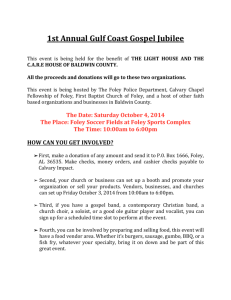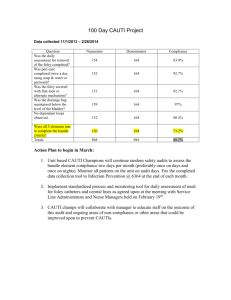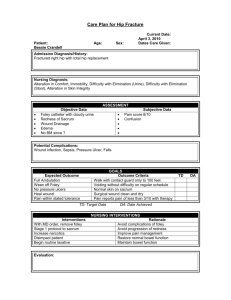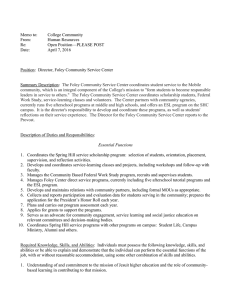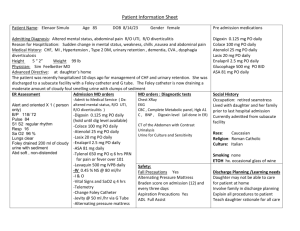29 Sunday in Ordinary Time, Year A Joseph M. O’Keefe, S.J.
advertisement
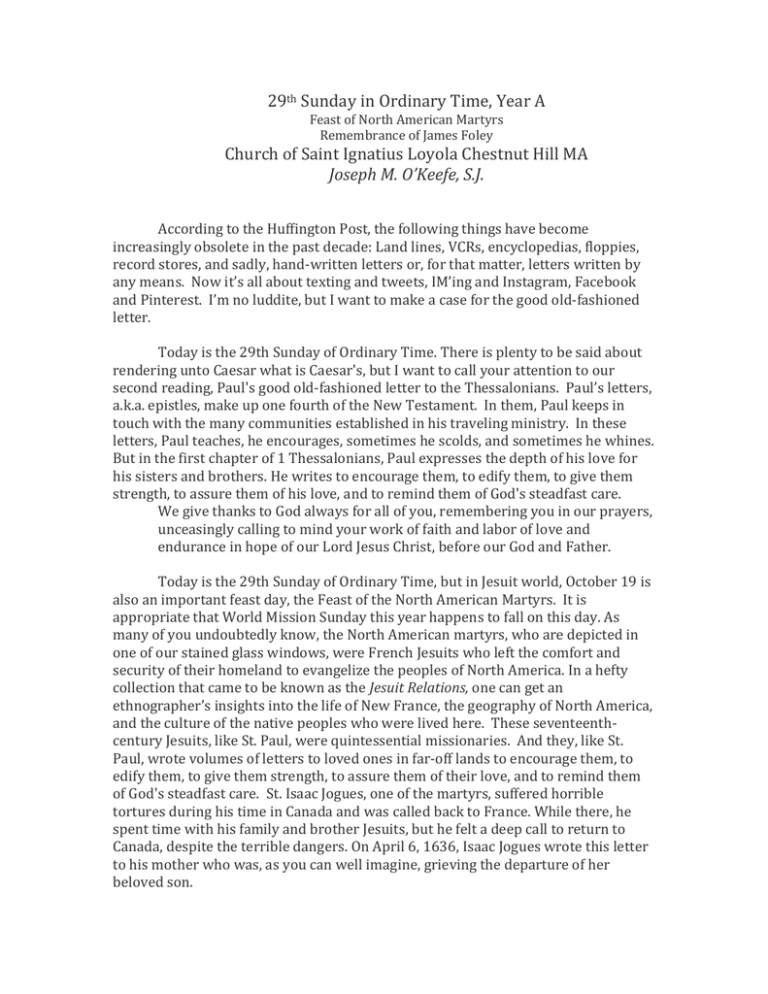
29th Sunday in Ordinary Time, Year A Feast of North American Martyrs Remembrance of James Foley Church of Saint Ignatius Loyola Chestnut Hill MA Joseph M. O’Keefe, S.J. According to the Huffington Post, the following things have become increasingly obsolete in the past decade: Land lines, VCRs, encyclopedias, floppies, record stores, and sadly, hand-written letters or, for that matter, letters written by any means. Now it’s all about texting and tweets, IM’ing and Instagram, Facebook and Pinterest. I’m no luddite, but I want to make a case for the good old-fashioned letter. Today is the 29th Sunday of Ordinary Time. There is plenty to be said about rendering unto Caesar what is Caesar's, but I want to call your attention to our second reading, Paul's good old-fashioned letter to the Thessalonians. Paul’s letters, a.k.a. epistles, make up one fourth of the New Testament. In them, Paul keeps in touch with the many communities established in his traveling ministry. In these letters, Paul teaches, he encourages, sometimes he scolds, and sometimes he whines. But in the first chapter of 1 Thessalonians, Paul expresses the depth of his love for his sisters and brothers. He writes to encourage them, to edify them, to give them strength, to assure them of his love, and to remind them of God's steadfast care. We give thanks to God always for all of you, remembering you in our prayers, unceasingly calling to mind your work of faith and labor of love and endurance in hope of our Lord Jesus Christ, before our God and Father. Today is the 29th Sunday of Ordinary Time, but in Jesuit world, October 19 is also an important feast day, the Feast of the North American Martyrs. It is appropriate that World Mission Sunday this year happens to fall on this day. As many of you undoubtedly know, the North American martyrs, who are depicted in one of our stained glass windows, were French Jesuits who left the comfort and security of their homeland to evangelize the peoples of North America. In a hefty collection that came to be known as the Jesuit Relations, one can get an ethnographer’s insights into the life of New France, the geography of North America, and the culture of the native peoples who were lived here. These seventeenthcentury Jesuits, like St. Paul, were quintessential missionaries. And they, like St. Paul, wrote volumes of letters to loved ones in far-off lands to encourage them, to edify them, to give them strength, to assure them of their love, and to remind them of God's steadfast care. St. Isaac Jogues, one of the martyrs, suffered horrible tortures during his time in Canada and was called back to France. While there, he spent time with his family and brother Jesuits, but he felt a deep call to return to Canada, despite the terrible dangers. On April 6, 1636, Isaac Jogues wrote this letter to his mother who was, as you can well imagine, grieving the departure of her beloved son. 2 I hope, as I said on another occasion, that if you take this little affliction in a proper spirit, it will be most pleasing to God, for whose sake it would become you to give, not one son only, but all the others, nay, life itself, if it were necessary. Men, for a little gain, cross the seas, enduring, at least, as much as we; and shall we not, for God’s love, do what men do for earthly interests! Goodbye, dear mother. I thank you for all the affection that you have ever shown me, and above all at our last meeting. May God unite us in His holy paradise, if we do not see each other again on earth! Today is the 29th Sunday in Ordinary Time and it is the feast of the North American martyrs. It is also a day when Jesuit colleges and universities throughout the United States are remembering one of our alumni at all of our many masses coast-to-coast. You undoubtedly recognize the name “James Foley,” a graduate of Marquette University who was a regular on service trips, a Teach for America alumnus, a former USAID worker and a dedicated journalist, who was brutally beheaded by ISIS terrorists last August. Though the circumstances were vastly different, Foley, like Sts. Paul and Isaac Jogues, was a man of deep faith; like Sts. Paul and Isaac Jogues, Foley was an innocent man who faced a torturous death; and, like Sts. Paul and Isaac Jogues, Foley wrote letters to the people he loved to encourage them, to edify them, to give them strength, to assure them of his love, and to remind them of God's steadfast care. Before he was captured by Isis, Foley had been a hostage in Libya in 2011. He wrote a letter, an epistle if you will, published in Marquette Magazine. In that letter he chronicled some of his experiences. I and two colleagues had been captured and were being held in a military detention center in Tripoli. Each day brought increasing worry that our moms would begin to panic. My colleague, Clare, was supposed to call her mom on her birthday, which was the day after we were captured. I had still not fully admitted to myself that my mom knew what had happened. But I kept telling Clare my mom had a strong faith. I prayed she’d know I was OK. I prayed I could communicate through some cosmic reach of the universe to her. I began to pray the rosary. It was what my mother and grandmother would have prayed. I said 10 Hail Marys between each Our Father. It took a long time, almost an hour to count 100 Hail Marys off on my knuckles. And it helped to keep my mind focused. Clare and I prayed together out loud. It felt energizing to speak our weaknesses and hopes together, as if in a conversation with God, rather than silently and alone. The letter then described a phone call that Foley had with his mother. One night, 18 days into our captivity, some guards brought me out of the cell. I saw another colleague for the first time in a week. We were haggard but overjoyed to see each other. Upstairs in the warden’s office, a distinguished man and a suit stood and said, "We felt you might want to call your families." I said a prayer and dialed the number. My mom answered the phone. "Mom, mom, it's me, Jim." "Jimmy, where are you?" "I'm still in Libya, Mom. I'm sorry about this. So sorry." “Don’t be sorry, Jim,” she pleaded. “Oh, Daddy just 2 3 left. Oh … He so wants to talk to you. How are you, Jim?” I told her I was being fed, that I was getting the best bed and being treated like a guest. “Are they making you say these things, Jim?” “No, the Libyans are beautiful people,” I told her. “I’ve been praying for you to know that I’m OK,” I said. “Haven’t you felt my prayers?” “Oh, Jimmy, so many people are praying for you. All your friends have been calling. Your brother Michael loves you so much.” She started to cry. They’re having a prayer vigil for you at Marquette. Don’t you feel our prayers?” she asked. “I do, Mom, I feel them,” and I thought about this for a second. Maybe it was others’ prayers strengthening me, keeping me afloat. James Foley was released from his captors in Libya but he felt the call to expose to the world the plight of people in the Middle East and he returned there. We all know how the story ended. Shortly before his death, he was able to smuggle a letter to his parents. In that letter, Foley said: I remember going to the mall with dad, a very long bike ride with mom. I remember so many great family times that take me away from this prison. Dreams of family and friends take me away and happiness fills my heart…I know you are thinking of me and praying for me. And I am so thankful. I feel you all, especially when I pray. I pray for you to stay strong and to believe. I really feel I can touch you, even in this darkness, when I pray. When we remember James Foley, let’s not focus on the horror of seeing him in prisoner orange, with a masked executioner, small knife in hand, ready to slowly sever away his head. Let’s think instead of Foley’s love, his courage and his faith. So what is God saying to you and me in all of this, we who are unlikely to be tortured and killed like St. Paul, the North American martyrs, and James Foley? I think that we called to write our own epistles, in traditional prose or in whatever format. Ask yourself the following questions. Is there someone who needs to hear from me, who needs to be edified by the witness of my faith. Am I being called to reach out to someone who is afraid and lonely, and who will be consoled by the knowledge that I hold him or her in my prayers tonight? Are there people who love me deeply and who worry about me; is it time to reassure them that my strong faith will help me to weather whatever hardships life might bring? Am I being called to leave my zone of comfort, like the letter-writers we remember today, to become makers of peace in this violent and angry world and, to that end, to give and not to count the cost, to fight and not the heed the wounds, to toil and not to seek for rest, to labor and not to ask for reward. The gifts that God gives us are to be given away to others. And among the many gifts all of you here in this church have received, the greatest ones are the ability to love deeply, to be hopeful even in the midst of suffering, and to have faith in the power of prayer. Give those gifts away. Do not let your faith grow stagnant; let your faith become a blessing for other 3 4 4
